Entrepreneurship and Small Business Management Report: Analysis
VerifiedAdded on 2020/01/28
|18
|6411
|2179
Report
AI Summary
This report delves into the multifaceted world of entrepreneurship and small business management. It begins by defining entrepreneurship and exploring different types of ventures, including small business ventures, scalable start-ups, large company ventures, social ventures, female entrepreneurs, and serial entrepreneurs. The report examines the relationship between these ventures and entrepreneurial typology, highlighting similarities and differences in goals, mindset, and marketing communication. The impact of micro and small business enterprises on the economy is then assessed, followed by an exploration of the importance of small businesses and start-ups in fostering social and economic growth. Furthermore, the report investigates the characteristics, traits, and skills of successful entrepreneurs, analyzing how entrepreneurial personality aspects reflect motivation and mind-set. Finally, it examines how background and experience can either hinder or foster entrepreneurial endeavors. The report concludes by summarizing the key findings and insights into the dynamic landscape of entrepreneurship.

Entrepreneurship and
Small Business
Management
Table of Contents
Small Business
Management
Table of Contents
Paraphrase This Document
Need a fresh take? Get an instant paraphrase of this document with our AI Paraphraser
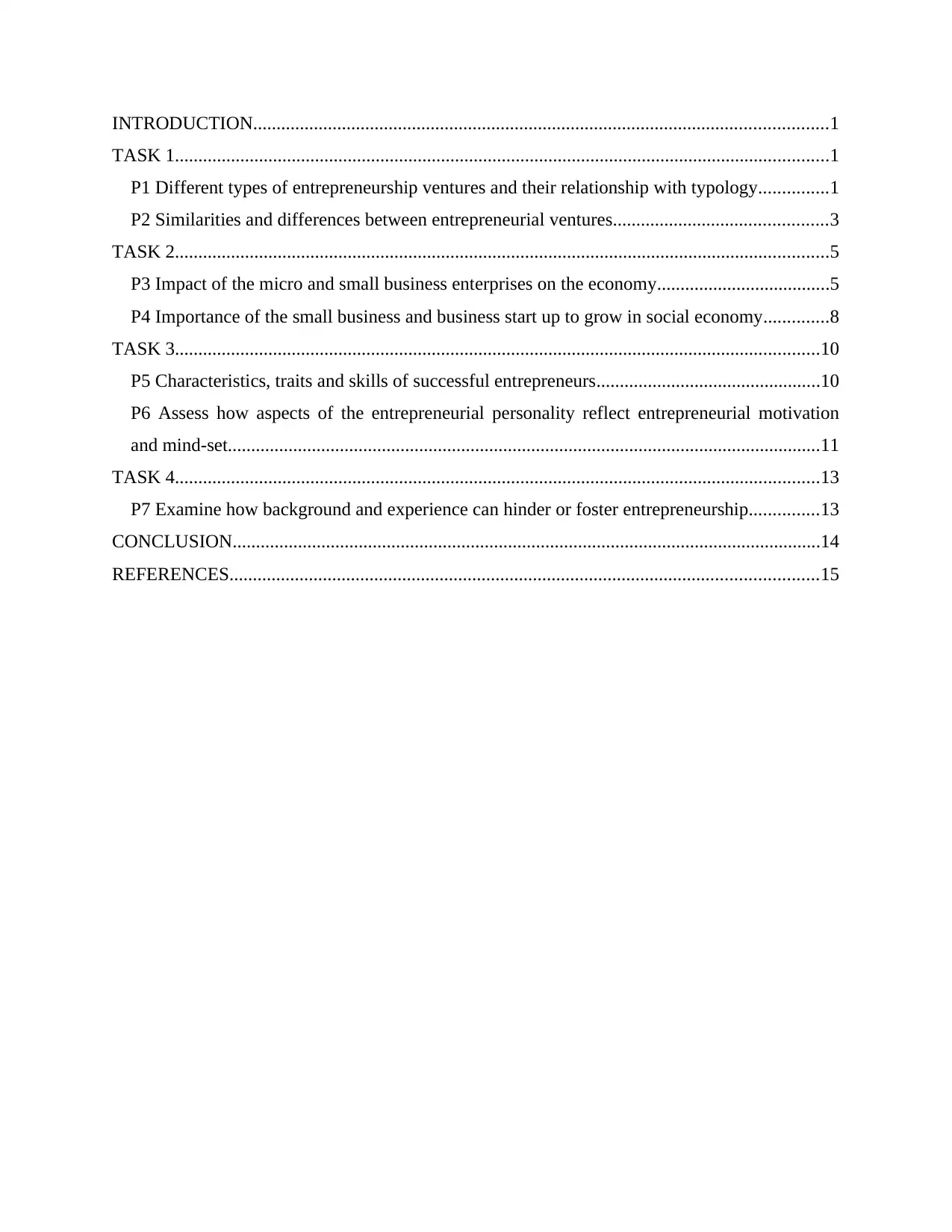
INTRODUCTION...........................................................................................................................1
TASK 1............................................................................................................................................1
P1 Different types of entrepreneurship ventures and their relationship with typology...............1
P2 Similarities and differences between entrepreneurial ventures..............................................3
TASK 2............................................................................................................................................5
P3 Impact of the micro and small business enterprises on the economy.....................................5
P4 Importance of the small business and business start up to grow in social economy..............8
TASK 3..........................................................................................................................................10
P5 Characteristics, traits and skills of successful entrepreneurs................................................10
P6 Assess how aspects of the entrepreneurial personality reflect entrepreneurial motivation
and mind-set...............................................................................................................................11
TASK 4..........................................................................................................................................13
P7 Examine how background and experience can hinder or foster entrepreneurship...............13
CONCLUSION..............................................................................................................................14
REFERENCES..............................................................................................................................15
TASK 1............................................................................................................................................1
P1 Different types of entrepreneurship ventures and their relationship with typology...............1
P2 Similarities and differences between entrepreneurial ventures..............................................3
TASK 2............................................................................................................................................5
P3 Impact of the micro and small business enterprises on the economy.....................................5
P4 Importance of the small business and business start up to grow in social economy..............8
TASK 3..........................................................................................................................................10
P5 Characteristics, traits and skills of successful entrepreneurs................................................10
P6 Assess how aspects of the entrepreneurial personality reflect entrepreneurial motivation
and mind-set...............................................................................................................................11
TASK 4..........................................................................................................................................13
P7 Examine how background and experience can hinder or foster entrepreneurship...............13
CONCLUSION..............................................................................................................................14
REFERENCES..............................................................................................................................15
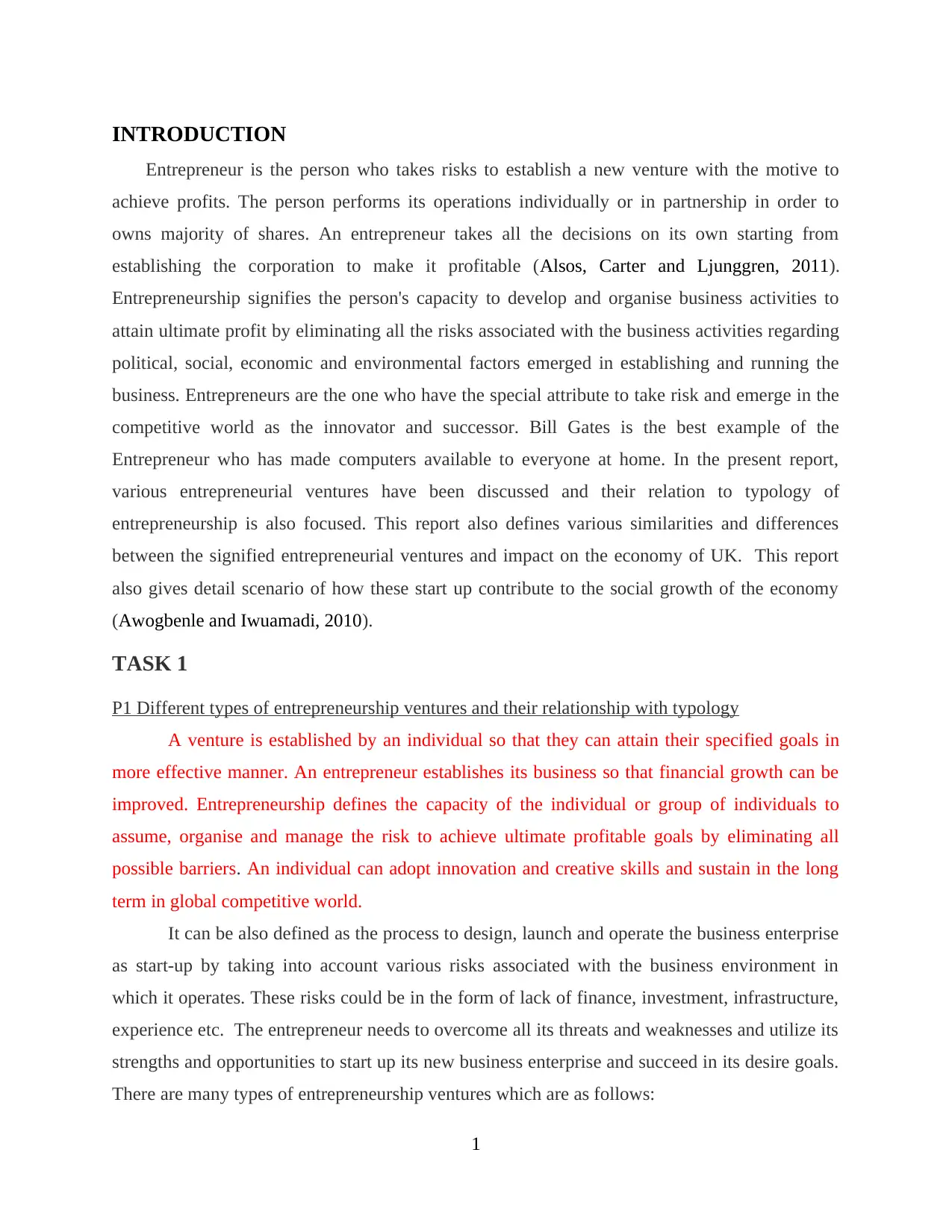
INTRODUCTION
Entrepreneur is the person who takes risks to establish a new venture with the motive to
achieve profits. The person performs its operations individually or in partnership in order to
owns majority of shares. An entrepreneur takes all the decisions on its own starting from
establishing the corporation to make it profitable (Alsos, Carter and Ljunggren, 2011).
Entrepreneurship signifies the person's capacity to develop and organise business activities to
attain ultimate profit by eliminating all the risks associated with the business activities regarding
political, social, economic and environmental factors emerged in establishing and running the
business. Entrepreneurs are the one who have the special attribute to take risk and emerge in the
competitive world as the innovator and successor. Bill Gates is the best example of the
Entrepreneur who has made computers available to everyone at home. In the present report,
various entrepreneurial ventures have been discussed and their relation to typology of
entrepreneurship is also focused. This report also defines various similarities and differences
between the signified entrepreneurial ventures and impact on the economy of UK. This report
also gives detail scenario of how these start up contribute to the social growth of the economy
(Awogbenle and Iwuamadi, 2010).
TASK 1
P1 Different types of entrepreneurship ventures and their relationship with typology
A venture is established by an individual so that they can attain their specified goals in
more effective manner. An entrepreneur establishes its business so that financial growth can be
improved. Entrepreneurship defines the capacity of the individual or group of individuals to
assume, organise and manage the risk to achieve ultimate profitable goals by eliminating all
possible barriers. An individual can adopt innovation and creative skills and sustain in the long
term in global competitive world.
It can be also defined as the process to design, launch and operate the business enterprise
as start-up by taking into account various risks associated with the business environment in
which it operates. These risks could be in the form of lack of finance, investment, infrastructure,
experience etc. The entrepreneur needs to overcome all its threats and weaknesses and utilize its
strengths and opportunities to start up its new business enterprise and succeed in its desire goals.
There are many types of entrepreneurship ventures which are as follows:
1
Entrepreneur is the person who takes risks to establish a new venture with the motive to
achieve profits. The person performs its operations individually or in partnership in order to
owns majority of shares. An entrepreneur takes all the decisions on its own starting from
establishing the corporation to make it profitable (Alsos, Carter and Ljunggren, 2011).
Entrepreneurship signifies the person's capacity to develop and organise business activities to
attain ultimate profit by eliminating all the risks associated with the business activities regarding
political, social, economic and environmental factors emerged in establishing and running the
business. Entrepreneurs are the one who have the special attribute to take risk and emerge in the
competitive world as the innovator and successor. Bill Gates is the best example of the
Entrepreneur who has made computers available to everyone at home. In the present report,
various entrepreneurial ventures have been discussed and their relation to typology of
entrepreneurship is also focused. This report also defines various similarities and differences
between the signified entrepreneurial ventures and impact on the economy of UK. This report
also gives detail scenario of how these start up contribute to the social growth of the economy
(Awogbenle and Iwuamadi, 2010).
TASK 1
P1 Different types of entrepreneurship ventures and their relationship with typology
A venture is established by an individual so that they can attain their specified goals in
more effective manner. An entrepreneur establishes its business so that financial growth can be
improved. Entrepreneurship defines the capacity of the individual or group of individuals to
assume, organise and manage the risk to achieve ultimate profitable goals by eliminating all
possible barriers. An individual can adopt innovation and creative skills and sustain in the long
term in global competitive world.
It can be also defined as the process to design, launch and operate the business enterprise
as start-up by taking into account various risks associated with the business environment in
which it operates. These risks could be in the form of lack of finance, investment, infrastructure,
experience etc. The entrepreneur needs to overcome all its threats and weaknesses and utilize its
strengths and opportunities to start up its new business enterprise and succeed in its desire goals.
There are many types of entrepreneurship ventures which are as follows:
1
⊘ This is a preview!⊘
Do you want full access?
Subscribe today to unlock all pages.

Trusted by 1+ million students worldwide
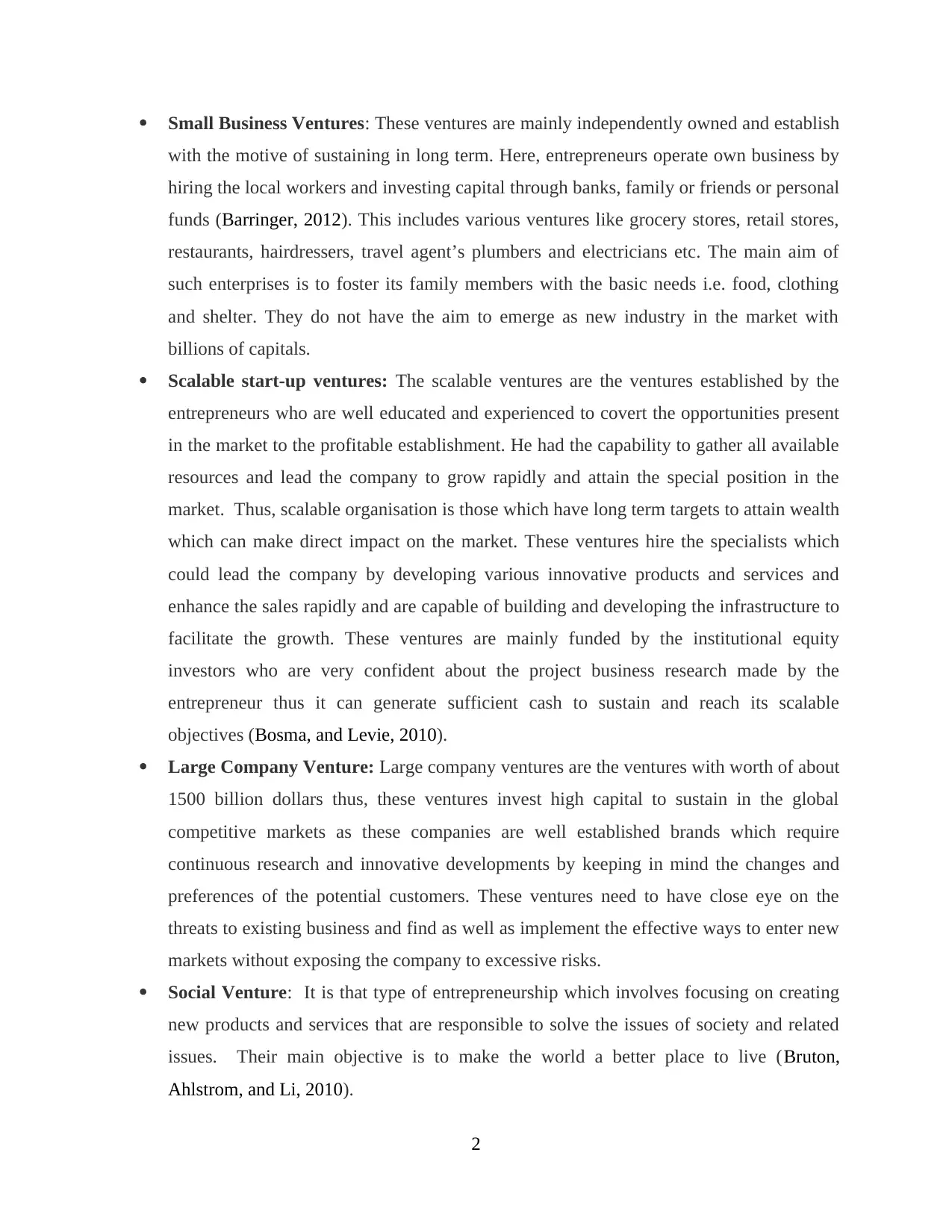
Small Business Ventures: These ventures are mainly independently owned and establish
with the motive of sustaining in long term. Here, entrepreneurs operate own business by
hiring the local workers and investing capital through banks, family or friends or personal
funds (Barringer, 2012). This includes various ventures like grocery stores, retail stores,
restaurants, hairdressers, travel agent’s plumbers and electricians etc. The main aim of
such enterprises is to foster its family members with the basic needs i.e. food, clothing
and shelter. They do not have the aim to emerge as new industry in the market with
billions of capitals.
Scalable start-up ventures: The scalable ventures are the ventures established by the
entrepreneurs who are well educated and experienced to covert the opportunities present
in the market to the profitable establishment. He had the capability to gather all available
resources and lead the company to grow rapidly and attain the special position in the
market. Thus, scalable organisation is those which have long term targets to attain wealth
which can make direct impact on the market. These ventures hire the specialists which
could lead the company by developing various innovative products and services and
enhance the sales rapidly and are capable of building and developing the infrastructure to
facilitate the growth. These ventures are mainly funded by the institutional equity
investors who are very confident about the project business research made by the
entrepreneur thus it can generate sufficient cash to sustain and reach its scalable
objectives (Bosma, and Levie, 2010).
Large Company Venture: Large company ventures are the ventures with worth of about
1500 billion dollars thus, these ventures invest high capital to sustain in the global
competitive markets as these companies are well established brands which require
continuous research and innovative developments by keeping in mind the changes and
preferences of the potential customers. These ventures need to have close eye on the
threats to existing business and find as well as implement the effective ways to enter new
markets without exposing the company to excessive risks.
Social Venture: It is that type of entrepreneurship which involves focusing on creating
new products and services that are responsible to solve the issues of society and related
issues. Their main objective is to make the world a better place to live (Bruton,
Ahlstrom, and Li, 2010).
2
with the motive of sustaining in long term. Here, entrepreneurs operate own business by
hiring the local workers and investing capital through banks, family or friends or personal
funds (Barringer, 2012). This includes various ventures like grocery stores, retail stores,
restaurants, hairdressers, travel agent’s plumbers and electricians etc. The main aim of
such enterprises is to foster its family members with the basic needs i.e. food, clothing
and shelter. They do not have the aim to emerge as new industry in the market with
billions of capitals.
Scalable start-up ventures: The scalable ventures are the ventures established by the
entrepreneurs who are well educated and experienced to covert the opportunities present
in the market to the profitable establishment. He had the capability to gather all available
resources and lead the company to grow rapidly and attain the special position in the
market. Thus, scalable organisation is those which have long term targets to attain wealth
which can make direct impact on the market. These ventures hire the specialists which
could lead the company by developing various innovative products and services and
enhance the sales rapidly and are capable of building and developing the infrastructure to
facilitate the growth. These ventures are mainly funded by the institutional equity
investors who are very confident about the project business research made by the
entrepreneur thus it can generate sufficient cash to sustain and reach its scalable
objectives (Bosma, and Levie, 2010).
Large Company Venture: Large company ventures are the ventures with worth of about
1500 billion dollars thus, these ventures invest high capital to sustain in the global
competitive markets as these companies are well established brands which require
continuous research and innovative developments by keeping in mind the changes and
preferences of the potential customers. These ventures need to have close eye on the
threats to existing business and find as well as implement the effective ways to enter new
markets without exposing the company to excessive risks.
Social Venture: It is that type of entrepreneurship which involves focusing on creating
new products and services that are responsible to solve the issues of society and related
issues. Their main objective is to make the world a better place to live (Bruton,
Ahlstrom, and Li, 2010).
2
Paraphrase This Document
Need a fresh take? Get an instant paraphrase of this document with our AI Paraphraser
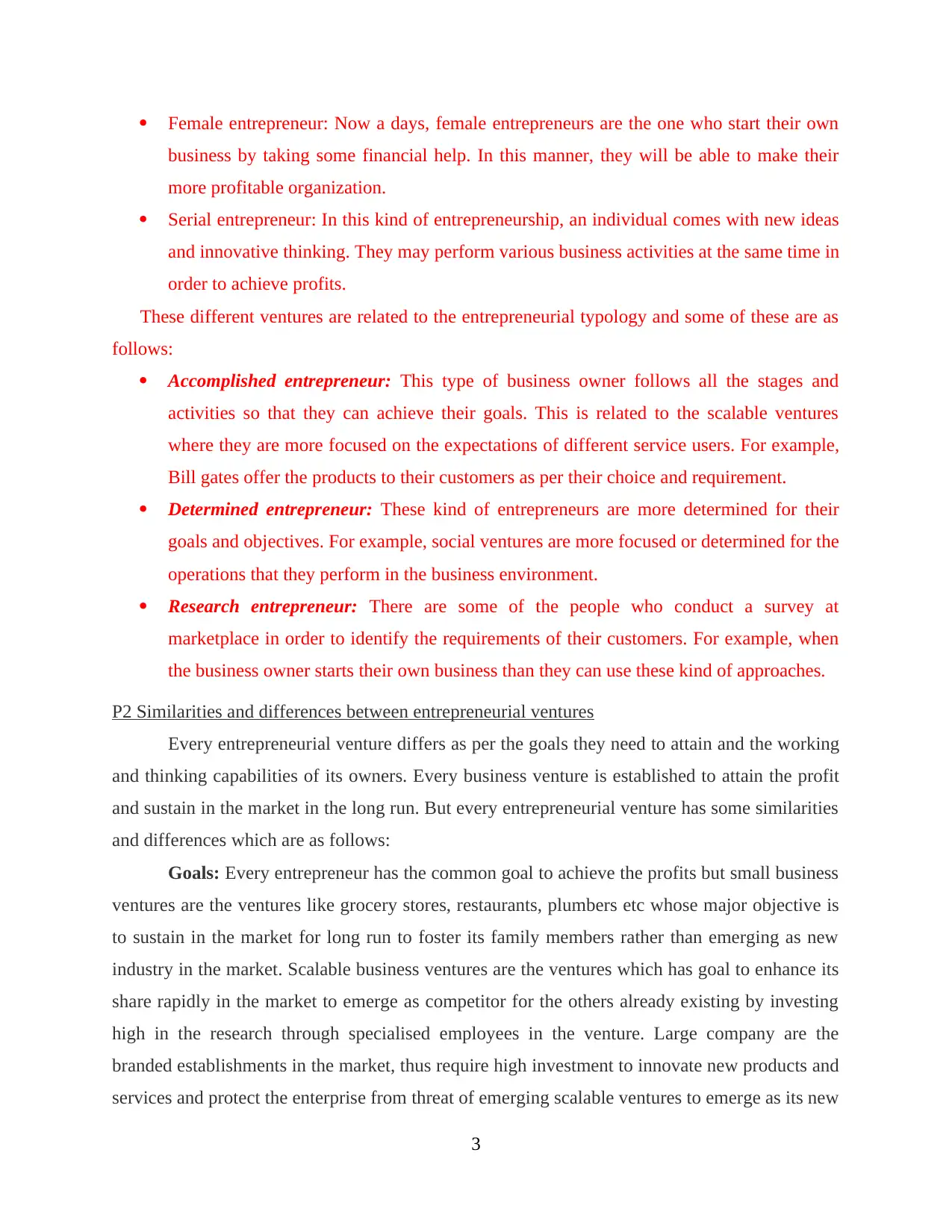
Female entrepreneur: Now a days, female entrepreneurs are the one who start their own
business by taking some financial help. In this manner, they will be able to make their
more profitable organization.
Serial entrepreneur: In this kind of entrepreneurship, an individual comes with new ideas
and innovative thinking. They may perform various business activities at the same time in
order to achieve profits.
These different ventures are related to the entrepreneurial typology and some of these are as
follows:
Accomplished entrepreneur: This type of business owner follows all the stages and
activities so that they can achieve their goals. This is related to the scalable ventures
where they are more focused on the expectations of different service users. For example,
Bill gates offer the products to their customers as per their choice and requirement.
Determined entrepreneur: These kind of entrepreneurs are more determined for their
goals and objectives. For example, social ventures are more focused or determined for the
operations that they perform in the business environment.
Research entrepreneur: There are some of the people who conduct a survey at
marketplace in order to identify the requirements of their customers. For example, when
the business owner starts their own business than they can use these kind of approaches.
P2 Similarities and differences between entrepreneurial ventures
Every entrepreneurial venture differs as per the goals they need to attain and the working
and thinking capabilities of its owners. Every business venture is established to attain the profit
and sustain in the market in the long run. But every entrepreneurial venture has some similarities
and differences which are as follows:
Goals: Every entrepreneur has the common goal to achieve the profits but small business
ventures are the ventures like grocery stores, restaurants, plumbers etc whose major objective is
to sustain in the market for long run to foster its family members rather than emerging as new
industry in the market. Scalable business ventures are the ventures which has goal to enhance its
share rapidly in the market to emerge as competitor for the others already existing by investing
high in the research through specialised employees in the venture. Large company are the
branded establishments in the market, thus require high investment to innovate new products and
services and protect the enterprise from threat of emerging scalable ventures to emerge as its new
3
business by taking some financial help. In this manner, they will be able to make their
more profitable organization.
Serial entrepreneur: In this kind of entrepreneurship, an individual comes with new ideas
and innovative thinking. They may perform various business activities at the same time in
order to achieve profits.
These different ventures are related to the entrepreneurial typology and some of these are as
follows:
Accomplished entrepreneur: This type of business owner follows all the stages and
activities so that they can achieve their goals. This is related to the scalable ventures
where they are more focused on the expectations of different service users. For example,
Bill gates offer the products to their customers as per their choice and requirement.
Determined entrepreneur: These kind of entrepreneurs are more determined for their
goals and objectives. For example, social ventures are more focused or determined for the
operations that they perform in the business environment.
Research entrepreneur: There are some of the people who conduct a survey at
marketplace in order to identify the requirements of their customers. For example, when
the business owner starts their own business than they can use these kind of approaches.
P2 Similarities and differences between entrepreneurial ventures
Every entrepreneurial venture differs as per the goals they need to attain and the working
and thinking capabilities of its owners. Every business venture is established to attain the profit
and sustain in the market in the long run. But every entrepreneurial venture has some similarities
and differences which are as follows:
Goals: Every entrepreneur has the common goal to achieve the profits but small business
ventures are the ventures like grocery stores, restaurants, plumbers etc whose major objective is
to sustain in the market for long run to foster its family members rather than emerging as new
industry in the market. Scalable business ventures are the ventures which has goal to enhance its
share rapidly in the market to emerge as competitor for the others already existing by investing
high in the research through specialised employees in the venture. Large company are the
branded establishments in the market, thus require high investment to innovate new products and
services and protect the enterprise from threat of emerging scalable ventures to emerge as its new
3
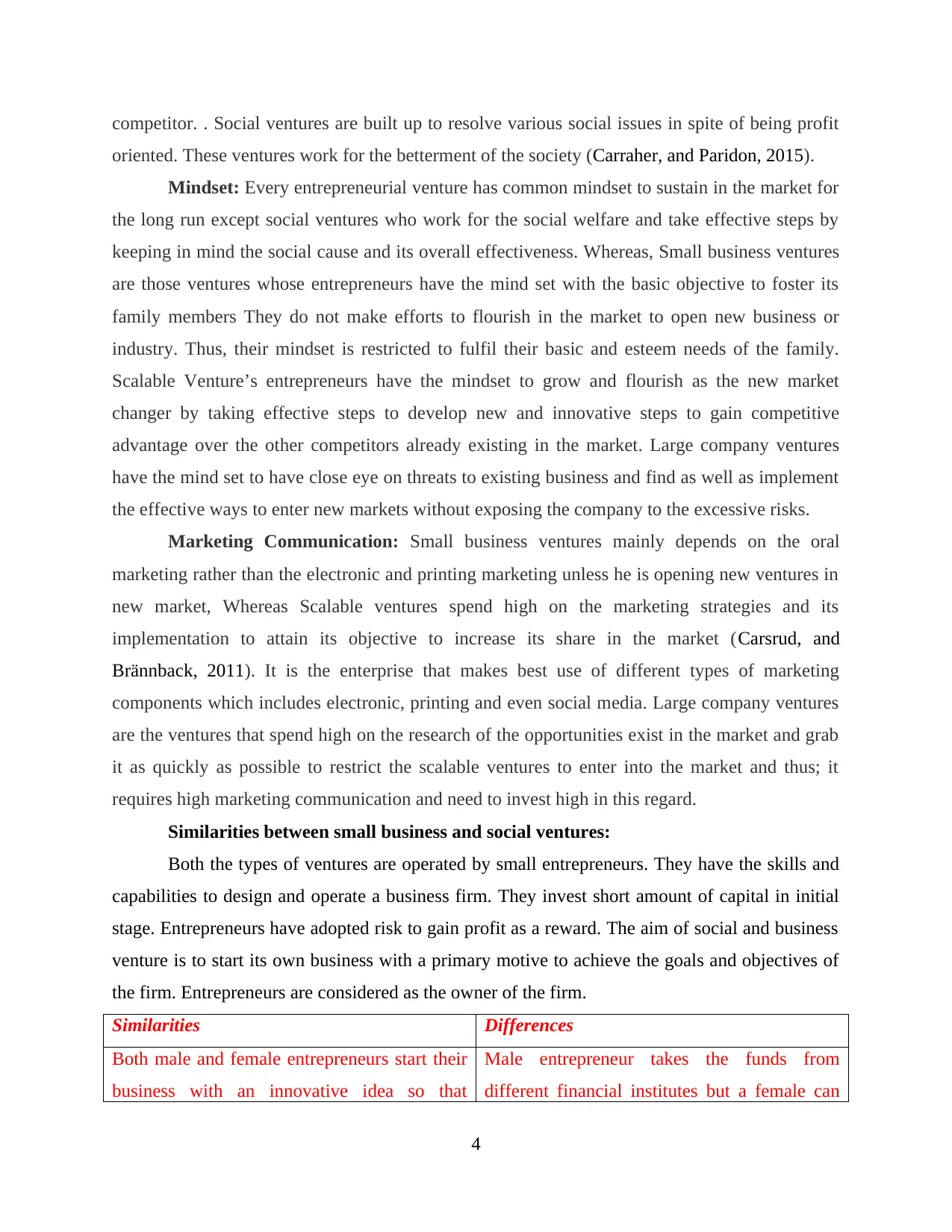
competitor. . Social ventures are built up to resolve various social issues in spite of being profit
oriented. These ventures work for the betterment of the society (Carraher, and Paridon, 2015).
Mindset: Every entrepreneurial venture has common mindset to sustain in the market for
the long run except social ventures who work for the social welfare and take effective steps by
keeping in mind the social cause and its overall effectiveness. Whereas, Small business ventures
are those ventures whose entrepreneurs have the mind set with the basic objective to foster its
family members They do not make efforts to flourish in the market to open new business or
industry. Thus, their mindset is restricted to fulfil their basic and esteem needs of the family.
Scalable Venture’s entrepreneurs have the mindset to grow and flourish as the new market
changer by taking effective steps to develop new and innovative steps to gain competitive
advantage over the other competitors already existing in the market. Large company ventures
have the mind set to have close eye on threats to existing business and find as well as implement
the effective ways to enter new markets without exposing the company to the excessive risks.
Marketing Communication: Small business ventures mainly depends on the oral
marketing rather than the electronic and printing marketing unless he is opening new ventures in
new market, Whereas Scalable ventures spend high on the marketing strategies and its
implementation to attain its objective to increase its share in the market (Carsrud, and
Brännback, 2011). It is the enterprise that makes best use of different types of marketing
components which includes electronic, printing and even social media. Large company ventures
are the ventures that spend high on the research of the opportunities exist in the market and grab
it as quickly as possible to restrict the scalable ventures to enter into the market and thus; it
requires high marketing communication and need to invest high in this regard.
Similarities between small business and social ventures:
Both the types of ventures are operated by small entrepreneurs. They have the skills and
capabilities to design and operate a business firm. They invest short amount of capital in initial
stage. Entrepreneurs have adopted risk to gain profit as a reward. The aim of social and business
venture is to start its own business with a primary motive to achieve the goals and objectives of
the firm. Entrepreneurs are considered as the owner of the firm.
Similarities Differences
Both male and female entrepreneurs start their
business with an innovative idea so that
Male entrepreneur takes the funds from
different financial institutes but a female can
4
oriented. These ventures work for the betterment of the society (Carraher, and Paridon, 2015).
Mindset: Every entrepreneurial venture has common mindset to sustain in the market for
the long run except social ventures who work for the social welfare and take effective steps by
keeping in mind the social cause and its overall effectiveness. Whereas, Small business ventures
are those ventures whose entrepreneurs have the mind set with the basic objective to foster its
family members They do not make efforts to flourish in the market to open new business or
industry. Thus, their mindset is restricted to fulfil their basic and esteem needs of the family.
Scalable Venture’s entrepreneurs have the mindset to grow and flourish as the new market
changer by taking effective steps to develop new and innovative steps to gain competitive
advantage over the other competitors already existing in the market. Large company ventures
have the mind set to have close eye on threats to existing business and find as well as implement
the effective ways to enter new markets without exposing the company to the excessive risks.
Marketing Communication: Small business ventures mainly depends on the oral
marketing rather than the electronic and printing marketing unless he is opening new ventures in
new market, Whereas Scalable ventures spend high on the marketing strategies and its
implementation to attain its objective to increase its share in the market (Carsrud, and
Brännback, 2011). It is the enterprise that makes best use of different types of marketing
components which includes electronic, printing and even social media. Large company ventures
are the ventures that spend high on the research of the opportunities exist in the market and grab
it as quickly as possible to restrict the scalable ventures to enter into the market and thus; it
requires high marketing communication and need to invest high in this regard.
Similarities between small business and social ventures:
Both the types of ventures are operated by small entrepreneurs. They have the skills and
capabilities to design and operate a business firm. They invest short amount of capital in initial
stage. Entrepreneurs have adopted risk to gain profit as a reward. The aim of social and business
venture is to start its own business with a primary motive to achieve the goals and objectives of
the firm. Entrepreneurs are considered as the owner of the firm.
Similarities Differences
Both male and female entrepreneurs start their
business with an innovative idea so that
Male entrepreneur takes the funds from
different financial institutes but a female can
4
⊘ This is a preview!⊘
Do you want full access?
Subscribe today to unlock all pages.

Trusted by 1+ million students worldwide
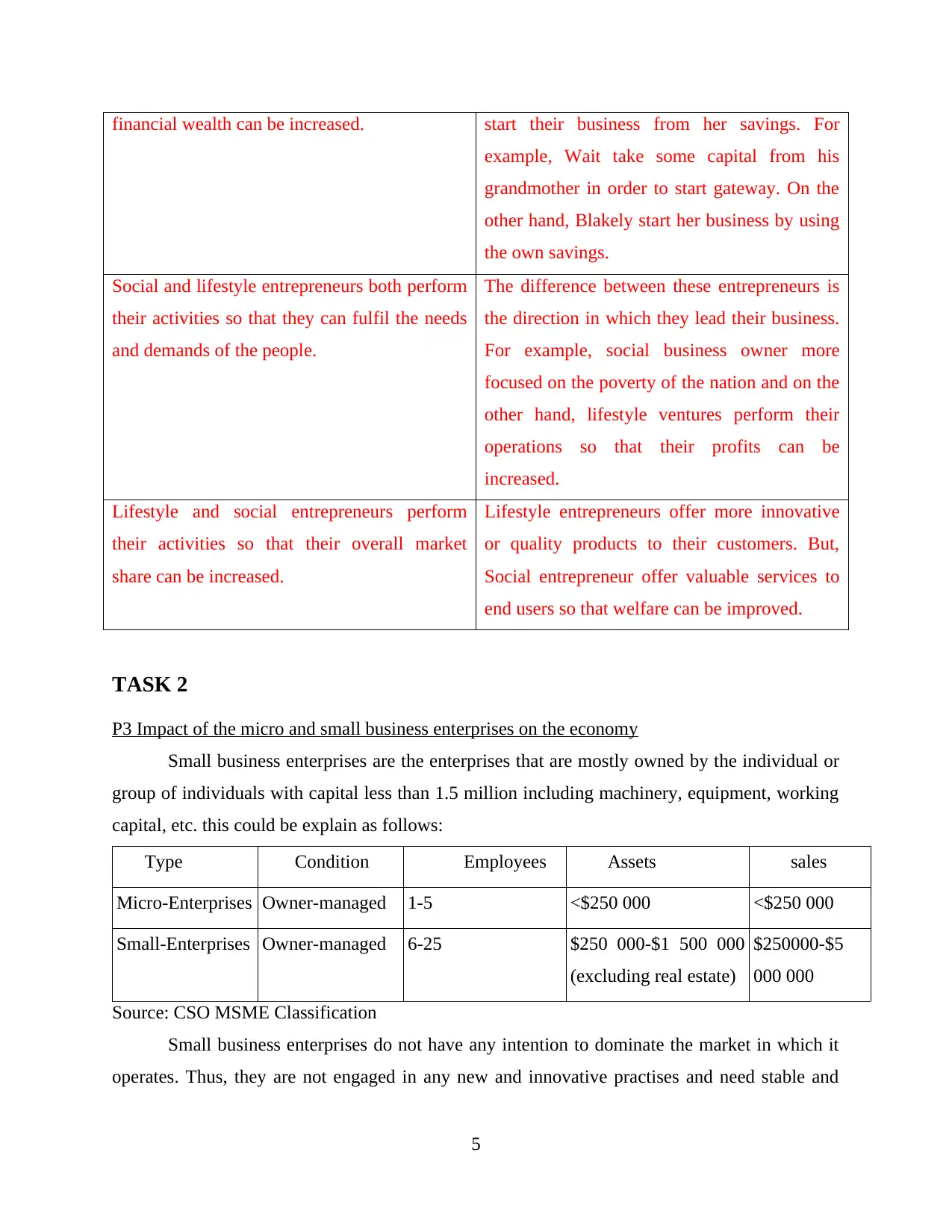
financial wealth can be increased. start their business from her savings. For
example, Wait take some capital from his
grandmother in order to start gateway. On the
other hand, Blakely start her business by using
the own savings.
Social and lifestyle entrepreneurs both perform
their activities so that they can fulfil the needs
and demands of the people.
The difference between these entrepreneurs is
the direction in which they lead their business.
For example, social business owner more
focused on the poverty of the nation and on the
other hand, lifestyle ventures perform their
operations so that their profits can be
increased.
Lifestyle and social entrepreneurs perform
their activities so that their overall market
share can be increased.
Lifestyle entrepreneurs offer more innovative
or quality products to their customers. But,
Social entrepreneur offer valuable services to
end users so that welfare can be improved.
TASK 2
P3 Impact of the micro and small business enterprises on the economy
Small business enterprises are the enterprises that are mostly owned by the individual or
group of individuals with capital less than 1.5 million including machinery, equipment, working
capital, etc. this could be explain as follows:
Type Condition Employees Assets sales
Micro-Enterprises Owner-managed 1-5 <$250 000 <$250 000
Small-Enterprises Owner-managed 6-25 $250 000-$1 500 000
(excluding real estate)
$250000-$5
000 000
Source: CSO MSME Classification
Small business enterprises do not have any intention to dominate the market in which it
operates. Thus, they are not engaged in any new and innovative practises and need stable and
5
example, Wait take some capital from his
grandmother in order to start gateway. On the
other hand, Blakely start her business by using
the own savings.
Social and lifestyle entrepreneurs both perform
their activities so that they can fulfil the needs
and demands of the people.
The difference between these entrepreneurs is
the direction in which they lead their business.
For example, social business owner more
focused on the poverty of the nation and on the
other hand, lifestyle ventures perform their
operations so that their profits can be
increased.
Lifestyle and social entrepreneurs perform
their activities so that their overall market
share can be increased.
Lifestyle entrepreneurs offer more innovative
or quality products to their customers. But,
Social entrepreneur offer valuable services to
end users so that welfare can be improved.
TASK 2
P3 Impact of the micro and small business enterprises on the economy
Small business enterprises are the enterprises that are mostly owned by the individual or
group of individuals with capital less than 1.5 million including machinery, equipment, working
capital, etc. this could be explain as follows:
Type Condition Employees Assets sales
Micro-Enterprises Owner-managed 1-5 <$250 000 <$250 000
Small-Enterprises Owner-managed 6-25 $250 000-$1 500 000
(excluding real estate)
$250000-$5
000 000
Source: CSO MSME Classification
Small business enterprises do not have any intention to dominate the market in which it
operates. Thus, they are not engaged in any new and innovative practises and need stable and
5
Paraphrase This Document
Need a fresh take? Get an instant paraphrase of this document with our AI Paraphraser
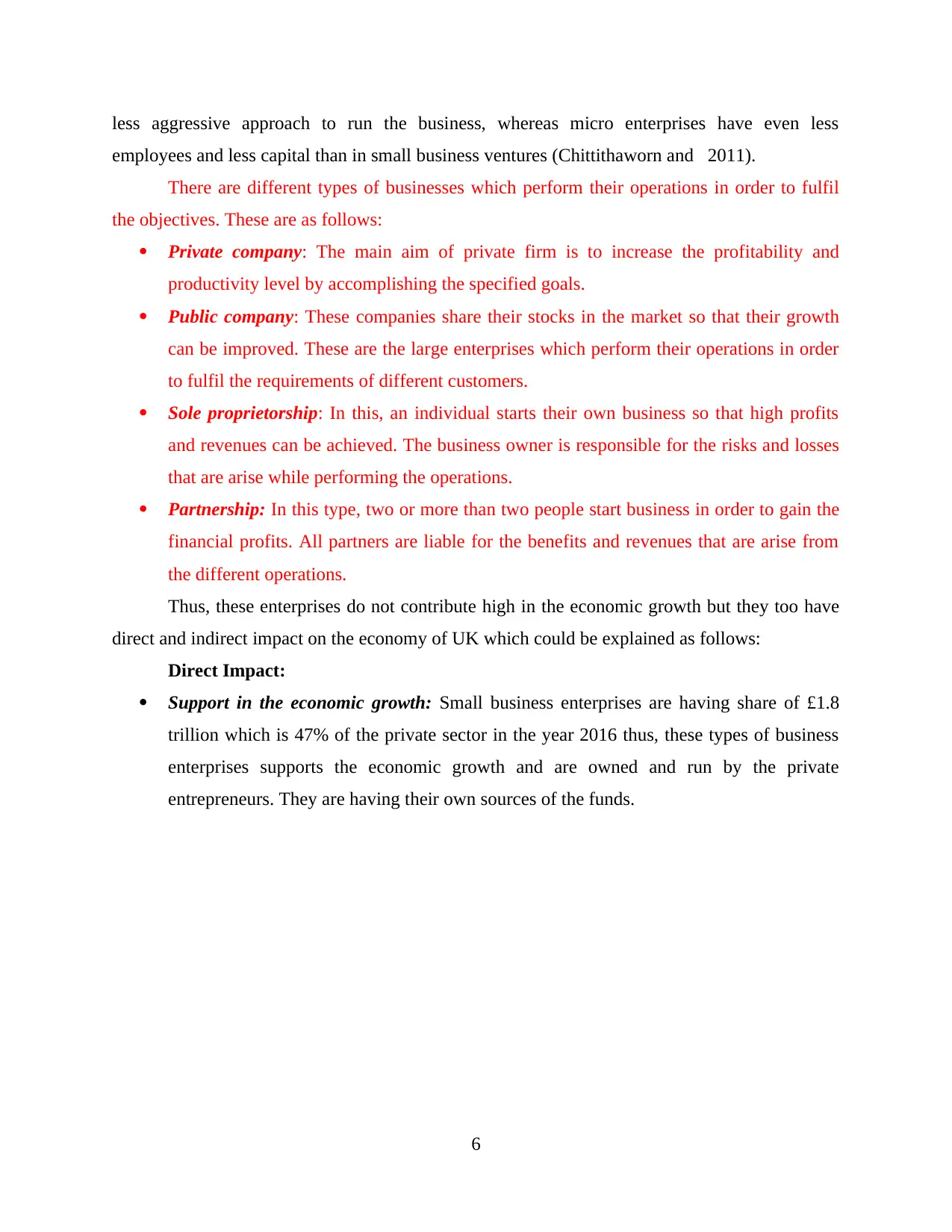
less aggressive approach to run the business, whereas micro enterprises have even less
employees and less capital than in small business ventures (Chittithaworn and 2011).
There are different types of businesses which perform their operations in order to fulfil
the objectives. These are as follows:
Private company: The main aim of private firm is to increase the profitability and
productivity level by accomplishing the specified goals.
Public company: These companies share their stocks in the market so that their growth
can be improved. These are the large enterprises which perform their operations in order
to fulfil the requirements of different customers.
Sole proprietorship: In this, an individual starts their own business so that high profits
and revenues can be achieved. The business owner is responsible for the risks and losses
that are arise while performing the operations.
Partnership: In this type, two or more than two people start business in order to gain the
financial profits. All partners are liable for the benefits and revenues that are arise from
the different operations.
Thus, these enterprises do not contribute high in the economic growth but they too have
direct and indirect impact on the economy of UK which could be explained as follows:
Direct Impact:
Support in the economic growth: Small business enterprises are having share of £1.8
trillion which is 47% of the private sector in the year 2016 thus, these types of business
enterprises supports the economic growth and are owned and run by the private
entrepreneurs. They are having their own sources of the funds.
6
employees and less capital than in small business ventures (Chittithaworn and 2011).
There are different types of businesses which perform their operations in order to fulfil
the objectives. These are as follows:
Private company: The main aim of private firm is to increase the profitability and
productivity level by accomplishing the specified goals.
Public company: These companies share their stocks in the market so that their growth
can be improved. These are the large enterprises which perform their operations in order
to fulfil the requirements of different customers.
Sole proprietorship: In this, an individual starts their own business so that high profits
and revenues can be achieved. The business owner is responsible for the risks and losses
that are arise while performing the operations.
Partnership: In this type, two or more than two people start business in order to gain the
financial profits. All partners are liable for the benefits and revenues that are arise from
the different operations.
Thus, these enterprises do not contribute high in the economic growth but they too have
direct and indirect impact on the economy of UK which could be explained as follows:
Direct Impact:
Support in the economic growth: Small business enterprises are having share of £1.8
trillion which is 47% of the private sector in the year 2016 thus, these types of business
enterprises supports the economic growth and are owned and run by the private
entrepreneurs. They are having their own sources of the funds.
6
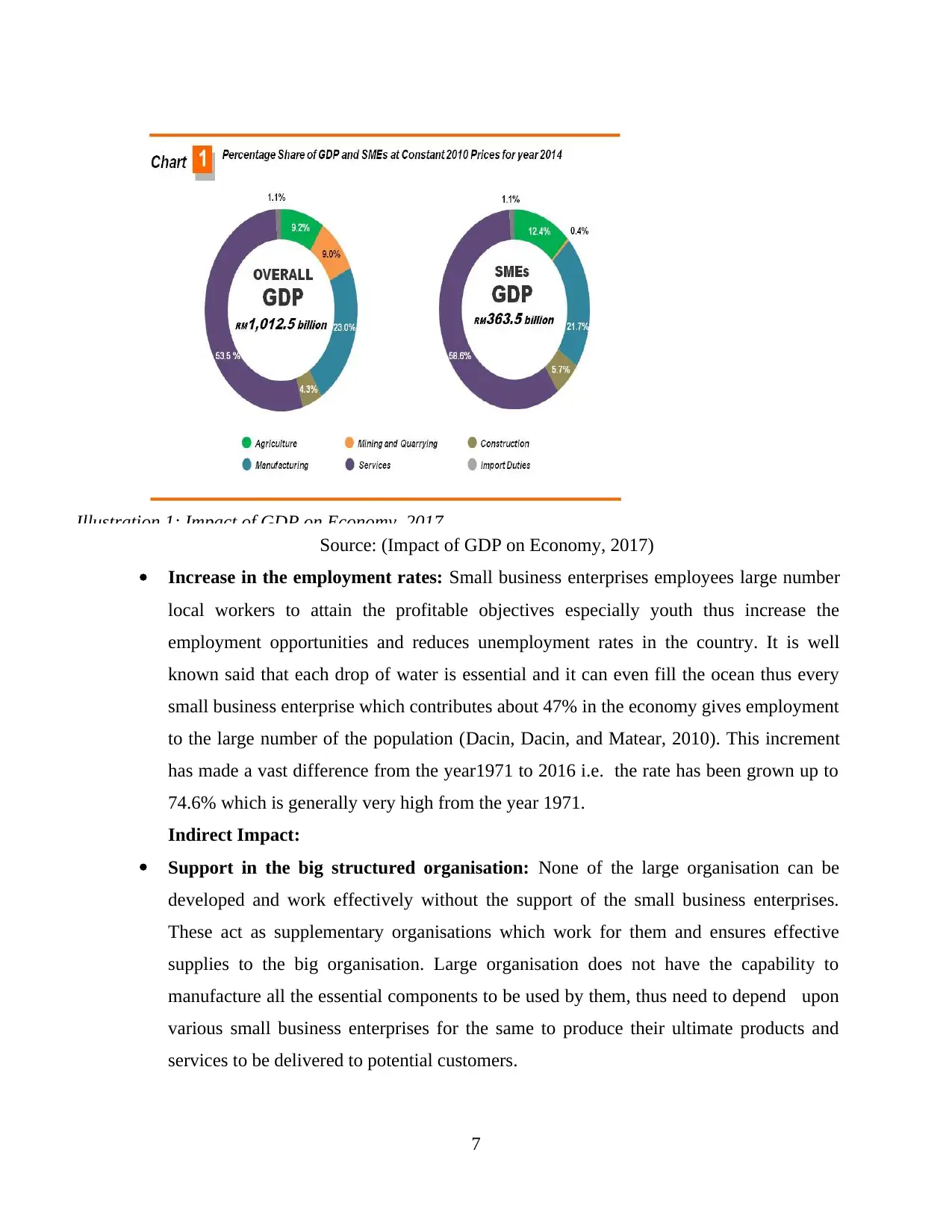
Source: (Impact of GDP on Economy, 2017)
Increase in the employment rates: Small business enterprises employees large number
local workers to attain the profitable objectives especially youth thus increase the
employment opportunities and reduces unemployment rates in the country. It is well
known said that each drop of water is essential and it can even fill the ocean thus every
small business enterprise which contributes about 47% in the economy gives employment
to the large number of the population (Dacin, Dacin, and Matear, 2010). This increment
has made a vast difference from the year1971 to 2016 i.e. the rate has been grown up to
74.6% which is generally very high from the year 1971.
Indirect Impact:
Support in the big structured organisation: None of the large organisation can be
developed and work effectively without the support of the small business enterprises.
These act as supplementary organisations which work for them and ensures effective
supplies to the big organisation. Large organisation does not have the capability to
manufacture all the essential components to be used by them, thus need to depend upon
various small business enterprises for the same to produce their ultimate products and
services to be delivered to potential customers.
7
Illustration 1: Impact of GDP on Economy, 2017
Increase in the employment rates: Small business enterprises employees large number
local workers to attain the profitable objectives especially youth thus increase the
employment opportunities and reduces unemployment rates in the country. It is well
known said that each drop of water is essential and it can even fill the ocean thus every
small business enterprise which contributes about 47% in the economy gives employment
to the large number of the population (Dacin, Dacin, and Matear, 2010). This increment
has made a vast difference from the year1971 to 2016 i.e. the rate has been grown up to
74.6% which is generally very high from the year 1971.
Indirect Impact:
Support in the big structured organisation: None of the large organisation can be
developed and work effectively without the support of the small business enterprises.
These act as supplementary organisations which work for them and ensures effective
supplies to the big organisation. Large organisation does not have the capability to
manufacture all the essential components to be used by them, thus need to depend upon
various small business enterprises for the same to produce their ultimate products and
services to be delivered to potential customers.
7
Illustration 1: Impact of GDP on Economy, 2017
⊘ This is a preview!⊘
Do you want full access?
Subscribe today to unlock all pages.

Trusted by 1+ million students worldwide
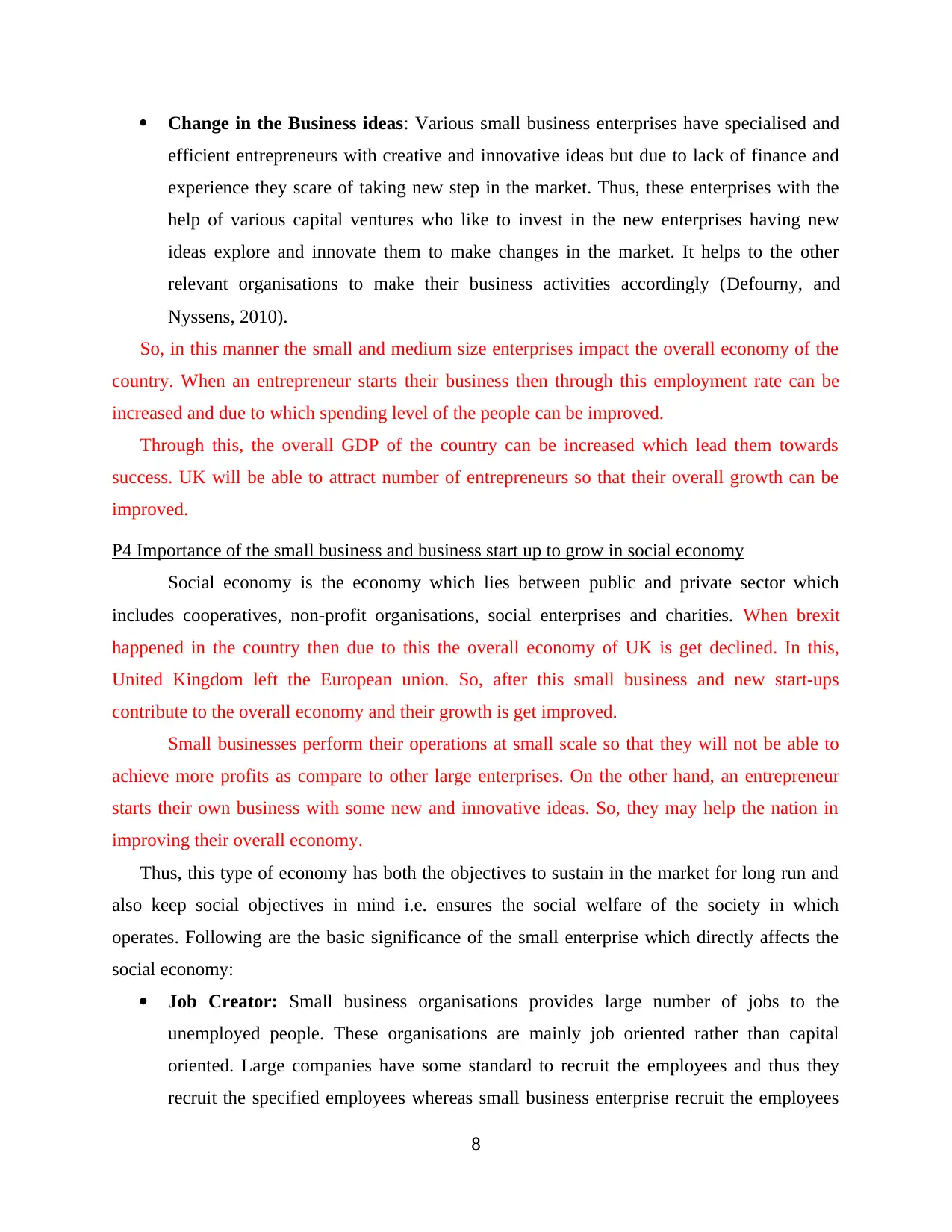
Change in the Business ideas: Various small business enterprises have specialised and
efficient entrepreneurs with creative and innovative ideas but due to lack of finance and
experience they scare of taking new step in the market. Thus, these enterprises with the
help of various capital ventures who like to invest in the new enterprises having new
ideas explore and innovate them to make changes in the market. It helps to the other
relevant organisations to make their business activities accordingly (Defourny, and
Nyssens, 2010).
So, in this manner the small and medium size enterprises impact the overall economy of the
country. When an entrepreneur starts their business then through this employment rate can be
increased and due to which spending level of the people can be improved.
Through this, the overall GDP of the country can be increased which lead them towards
success. UK will be able to attract number of entrepreneurs so that their overall growth can be
improved.
P4 Importance of the small business and business start up to grow in social economy
Social economy is the economy which lies between public and private sector which
includes cooperatives, non-profit organisations, social enterprises and charities. When brexit
happened in the country then due to this the overall economy of UK is get declined. In this,
United Kingdom left the European union. So, after this small business and new start-ups
contribute to the overall economy and their growth is get improved.
Small businesses perform their operations at small scale so that they will not be able to
achieve more profits as compare to other large enterprises. On the other hand, an entrepreneur
starts their own business with some new and innovative ideas. So, they may help the nation in
improving their overall economy.
Thus, this type of economy has both the objectives to sustain in the market for long run and
also keep social objectives in mind i.e. ensures the social welfare of the society in which
operates. Following are the basic significance of the small enterprise which directly affects the
social economy:
Job Creator: Small business organisations provides large number of jobs to the
unemployed people. These organisations are mainly job oriented rather than capital
oriented. Large companies have some standard to recruit the employees and thus they
recruit the specified employees whereas small business enterprise recruit the employees
8
efficient entrepreneurs with creative and innovative ideas but due to lack of finance and
experience they scare of taking new step in the market. Thus, these enterprises with the
help of various capital ventures who like to invest in the new enterprises having new
ideas explore and innovate them to make changes in the market. It helps to the other
relevant organisations to make their business activities accordingly (Defourny, and
Nyssens, 2010).
So, in this manner the small and medium size enterprises impact the overall economy of the
country. When an entrepreneur starts their business then through this employment rate can be
increased and due to which spending level of the people can be improved.
Through this, the overall GDP of the country can be increased which lead them towards
success. UK will be able to attract number of entrepreneurs so that their overall growth can be
improved.
P4 Importance of the small business and business start up to grow in social economy
Social economy is the economy which lies between public and private sector which
includes cooperatives, non-profit organisations, social enterprises and charities. When brexit
happened in the country then due to this the overall economy of UK is get declined. In this,
United Kingdom left the European union. So, after this small business and new start-ups
contribute to the overall economy and their growth is get improved.
Small businesses perform their operations at small scale so that they will not be able to
achieve more profits as compare to other large enterprises. On the other hand, an entrepreneur
starts their own business with some new and innovative ideas. So, they may help the nation in
improving their overall economy.
Thus, this type of economy has both the objectives to sustain in the market for long run and
also keep social objectives in mind i.e. ensures the social welfare of the society in which
operates. Following are the basic significance of the small enterprise which directly affects the
social economy:
Job Creator: Small business organisations provides large number of jobs to the
unemployed people. These organisations are mainly job oriented rather than capital
oriented. Large companies have some standard to recruit the employees and thus they
recruit the specified employees whereas small business enterprise recruit the employees
8
Paraphrase This Document
Need a fresh take? Get an instant paraphrase of this document with our AI Paraphraser
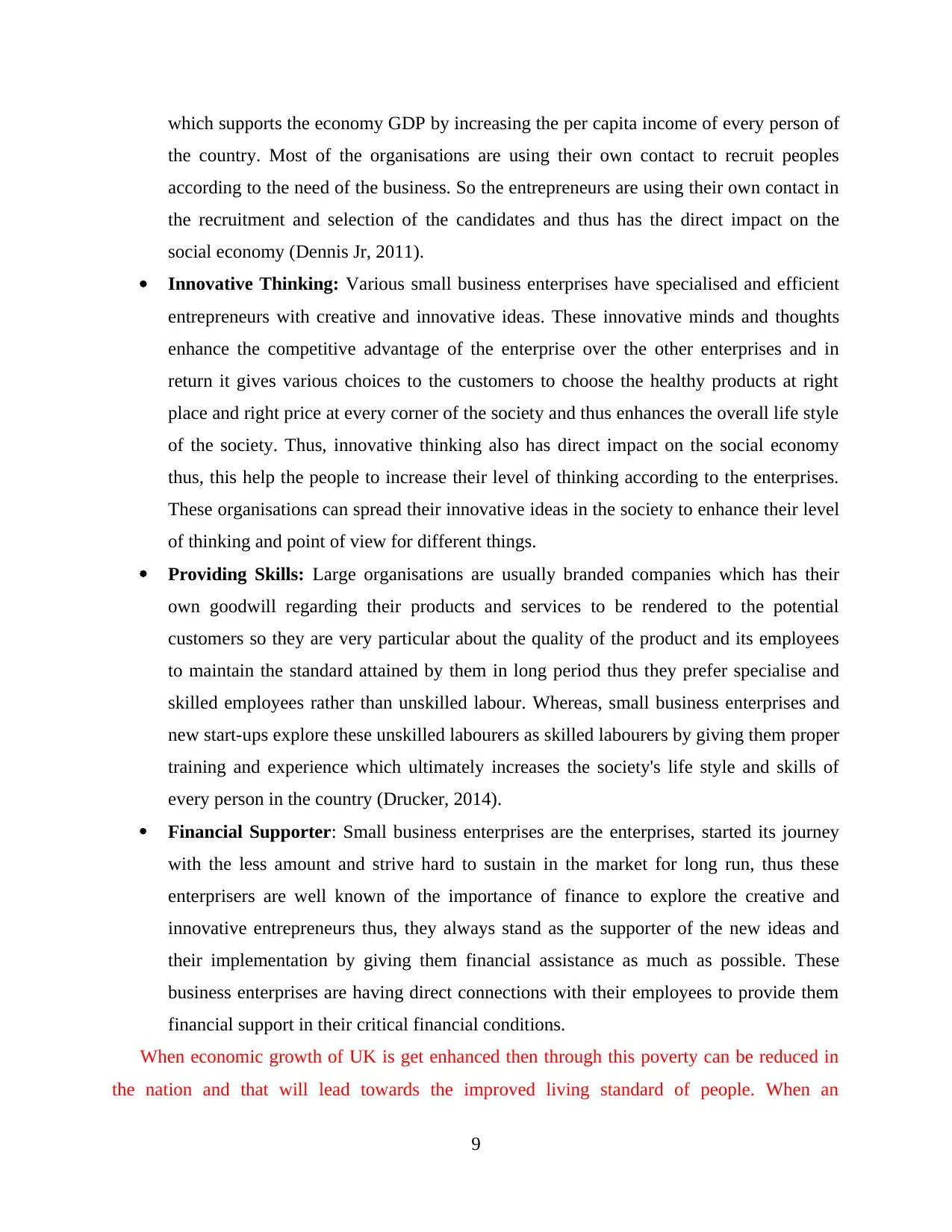
which supports the economy GDP by increasing the per capita income of every person of
the country. Most of the organisations are using their own contact to recruit peoples
according to the need of the business. So the entrepreneurs are using their own contact in
the recruitment and selection of the candidates and thus has the direct impact on the
social economy (Dennis Jr, 2011).
Innovative Thinking: Various small business enterprises have specialised and efficient
entrepreneurs with creative and innovative ideas. These innovative minds and thoughts
enhance the competitive advantage of the enterprise over the other enterprises and in
return it gives various choices to the customers to choose the healthy products at right
place and right price at every corner of the society and thus enhances the overall life style
of the society. Thus, innovative thinking also has direct impact on the social economy
thus, this help the people to increase their level of thinking according to the enterprises.
These organisations can spread their innovative ideas in the society to enhance their level
of thinking and point of view for different things.
Providing Skills: Large organisations are usually branded companies which has their
own goodwill regarding their products and services to be rendered to the potential
customers so they are very particular about the quality of the product and its employees
to maintain the standard attained by them in long period thus they prefer specialise and
skilled employees rather than unskilled labour. Whereas, small business enterprises and
new start-ups explore these unskilled labourers as skilled labourers by giving them proper
training and experience which ultimately increases the society's life style and skills of
every person in the country (Drucker, 2014).
Financial Supporter: Small business enterprises are the enterprises, started its journey
with the less amount and strive hard to sustain in the market for long run, thus these
enterprisers are well known of the importance of finance to explore the creative and
innovative entrepreneurs thus, they always stand as the supporter of the new ideas and
their implementation by giving them financial assistance as much as possible. These
business enterprises are having direct connections with their employees to provide them
financial support in their critical financial conditions.
When economic growth of UK is get enhanced then through this poverty can be reduced in
the nation and that will lead towards the improved living standard of people. When an
9
the country. Most of the organisations are using their own contact to recruit peoples
according to the need of the business. So the entrepreneurs are using their own contact in
the recruitment and selection of the candidates and thus has the direct impact on the
social economy (Dennis Jr, 2011).
Innovative Thinking: Various small business enterprises have specialised and efficient
entrepreneurs with creative and innovative ideas. These innovative minds and thoughts
enhance the competitive advantage of the enterprise over the other enterprises and in
return it gives various choices to the customers to choose the healthy products at right
place and right price at every corner of the society and thus enhances the overall life style
of the society. Thus, innovative thinking also has direct impact on the social economy
thus, this help the people to increase their level of thinking according to the enterprises.
These organisations can spread their innovative ideas in the society to enhance their level
of thinking and point of view for different things.
Providing Skills: Large organisations are usually branded companies which has their
own goodwill regarding their products and services to be rendered to the potential
customers so they are very particular about the quality of the product and its employees
to maintain the standard attained by them in long period thus they prefer specialise and
skilled employees rather than unskilled labour. Whereas, small business enterprises and
new start-ups explore these unskilled labourers as skilled labourers by giving them proper
training and experience which ultimately increases the society's life style and skills of
every person in the country (Drucker, 2014).
Financial Supporter: Small business enterprises are the enterprises, started its journey
with the less amount and strive hard to sustain in the market for long run, thus these
enterprisers are well known of the importance of finance to explore the creative and
innovative entrepreneurs thus, they always stand as the supporter of the new ideas and
their implementation by giving them financial assistance as much as possible. These
business enterprises are having direct connections with their employees to provide them
financial support in their critical financial conditions.
When economic growth of UK is get enhanced then through this poverty can be reduced in
the nation and that will lead towards the improved living standard of people. When an
9
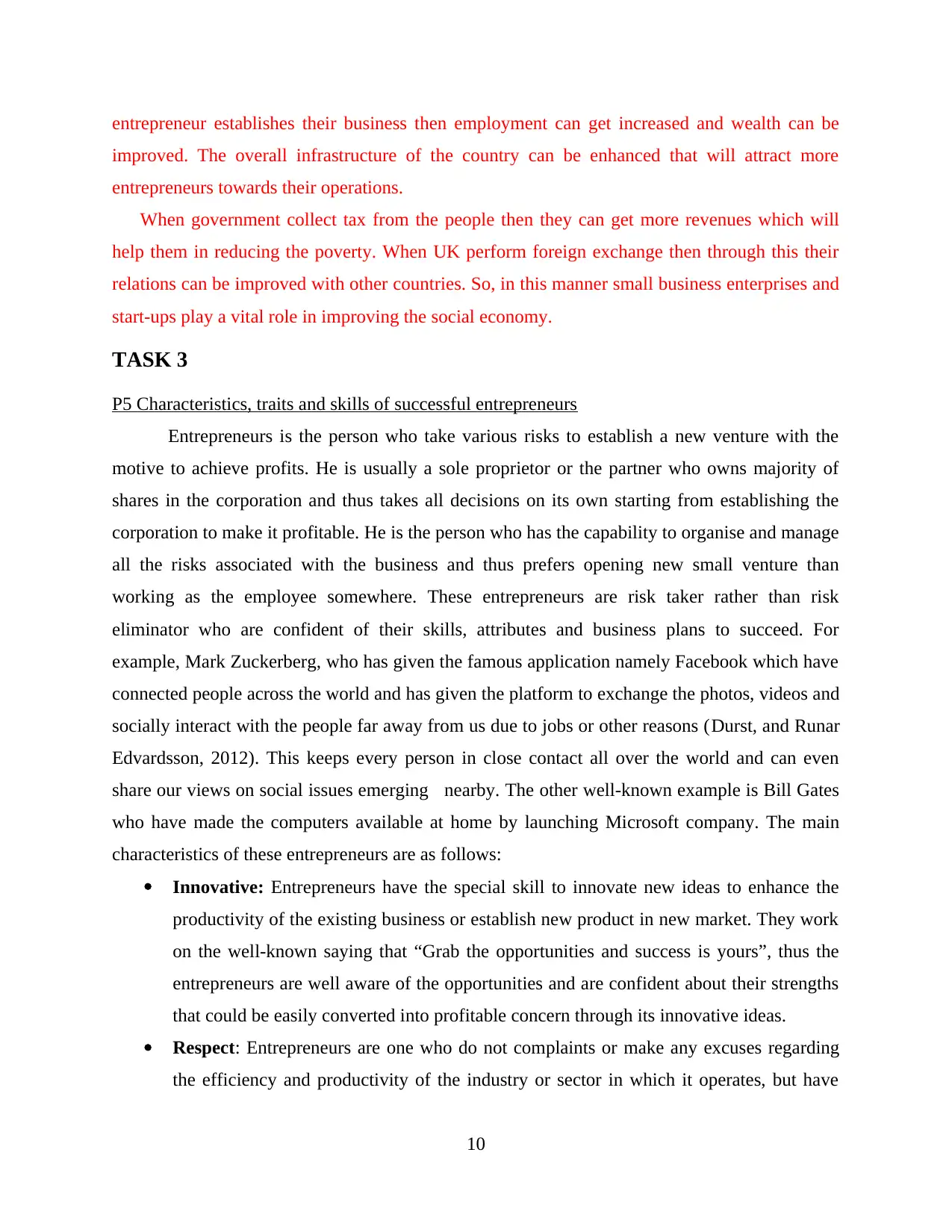
entrepreneur establishes their business then employment can get increased and wealth can be
improved. The overall infrastructure of the country can be enhanced that will attract more
entrepreneurs towards their operations.
When government collect tax from the people then they can get more revenues which will
help them in reducing the poverty. When UK perform foreign exchange then through this their
relations can be improved with other countries. So, in this manner small business enterprises and
start-ups play a vital role in improving the social economy.
TASK 3
P5 Characteristics, traits and skills of successful entrepreneurs
Entrepreneurs is the person who take various risks to establish a new venture with the
motive to achieve profits. He is usually a sole proprietor or the partner who owns majority of
shares in the corporation and thus takes all decisions on its own starting from establishing the
corporation to make it profitable. He is the person who has the capability to organise and manage
all the risks associated with the business and thus prefers opening new small venture than
working as the employee somewhere. These entrepreneurs are risk taker rather than risk
eliminator who are confident of their skills, attributes and business plans to succeed. For
example, Mark Zuckerberg, who has given the famous application namely Facebook which have
connected people across the world and has given the platform to exchange the photos, videos and
socially interact with the people far away from us due to jobs or other reasons (Durst, and Runar
Edvardsson, 2012). This keeps every person in close contact all over the world and can even
share our views on social issues emerging nearby. The other well-known example is Bill Gates
who have made the computers available at home by launching Microsoft company. The main
characteristics of these entrepreneurs are as follows:
Innovative: Entrepreneurs have the special skill to innovate new ideas to enhance the
productivity of the existing business or establish new product in new market. They work
on the well-known saying that “Grab the opportunities and success is yours”, thus the
entrepreneurs are well aware of the opportunities and are confident about their strengths
that could be easily converted into profitable concern through its innovative ideas.
Respect: Entrepreneurs are one who do not complaints or make any excuses regarding
the efficiency and productivity of the industry or sector in which it operates, but have
10
improved. The overall infrastructure of the country can be enhanced that will attract more
entrepreneurs towards their operations.
When government collect tax from the people then they can get more revenues which will
help them in reducing the poverty. When UK perform foreign exchange then through this their
relations can be improved with other countries. So, in this manner small business enterprises and
start-ups play a vital role in improving the social economy.
TASK 3
P5 Characteristics, traits and skills of successful entrepreneurs
Entrepreneurs is the person who take various risks to establish a new venture with the
motive to achieve profits. He is usually a sole proprietor or the partner who owns majority of
shares in the corporation and thus takes all decisions on its own starting from establishing the
corporation to make it profitable. He is the person who has the capability to organise and manage
all the risks associated with the business and thus prefers opening new small venture than
working as the employee somewhere. These entrepreneurs are risk taker rather than risk
eliminator who are confident of their skills, attributes and business plans to succeed. For
example, Mark Zuckerberg, who has given the famous application namely Facebook which have
connected people across the world and has given the platform to exchange the photos, videos and
socially interact with the people far away from us due to jobs or other reasons (Durst, and Runar
Edvardsson, 2012). This keeps every person in close contact all over the world and can even
share our views on social issues emerging nearby. The other well-known example is Bill Gates
who have made the computers available at home by launching Microsoft company. The main
characteristics of these entrepreneurs are as follows:
Innovative: Entrepreneurs have the special skill to innovate new ideas to enhance the
productivity of the existing business or establish new product in new market. They work
on the well-known saying that “Grab the opportunities and success is yours”, thus the
entrepreneurs are well aware of the opportunities and are confident about their strengths
that could be easily converted into profitable concern through its innovative ideas.
Respect: Entrepreneurs are one who do not complaints or make any excuses regarding
the efficiency and productivity of the industry or sector in which it operates, but have
10
⊘ This is a preview!⊘
Do you want full access?
Subscribe today to unlock all pages.

Trusted by 1+ million students worldwide
1 out of 18
Related Documents
Your All-in-One AI-Powered Toolkit for Academic Success.
+13062052269
info@desklib.com
Available 24*7 on WhatsApp / Email
![[object Object]](/_next/static/media/star-bottom.7253800d.svg)
Unlock your academic potential
Copyright © 2020–2026 A2Z Services. All Rights Reserved. Developed and managed by ZUCOL.





